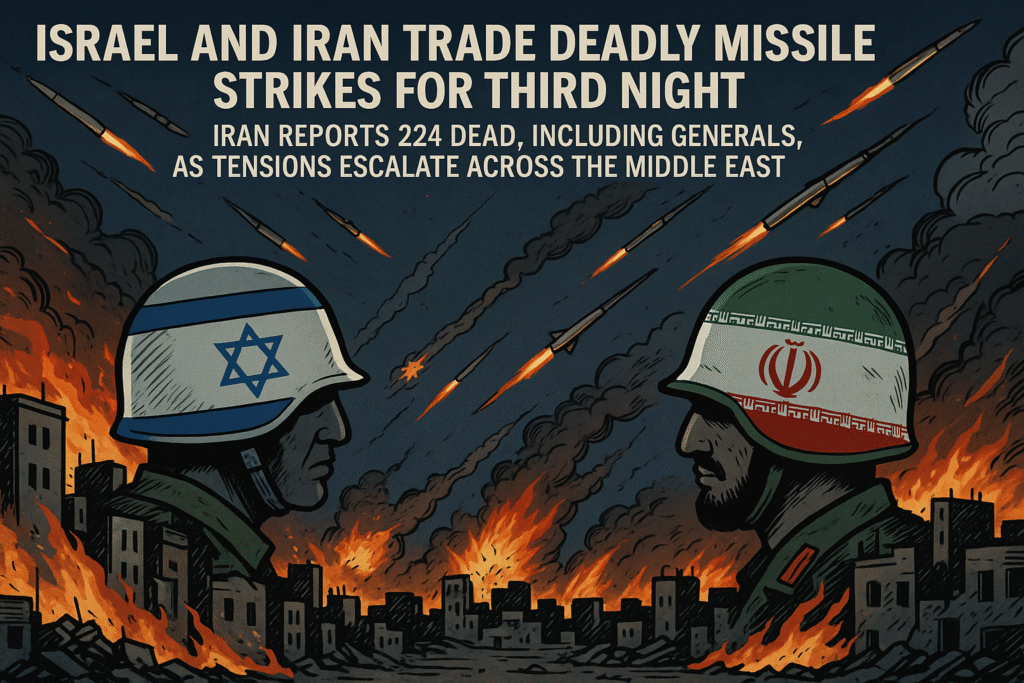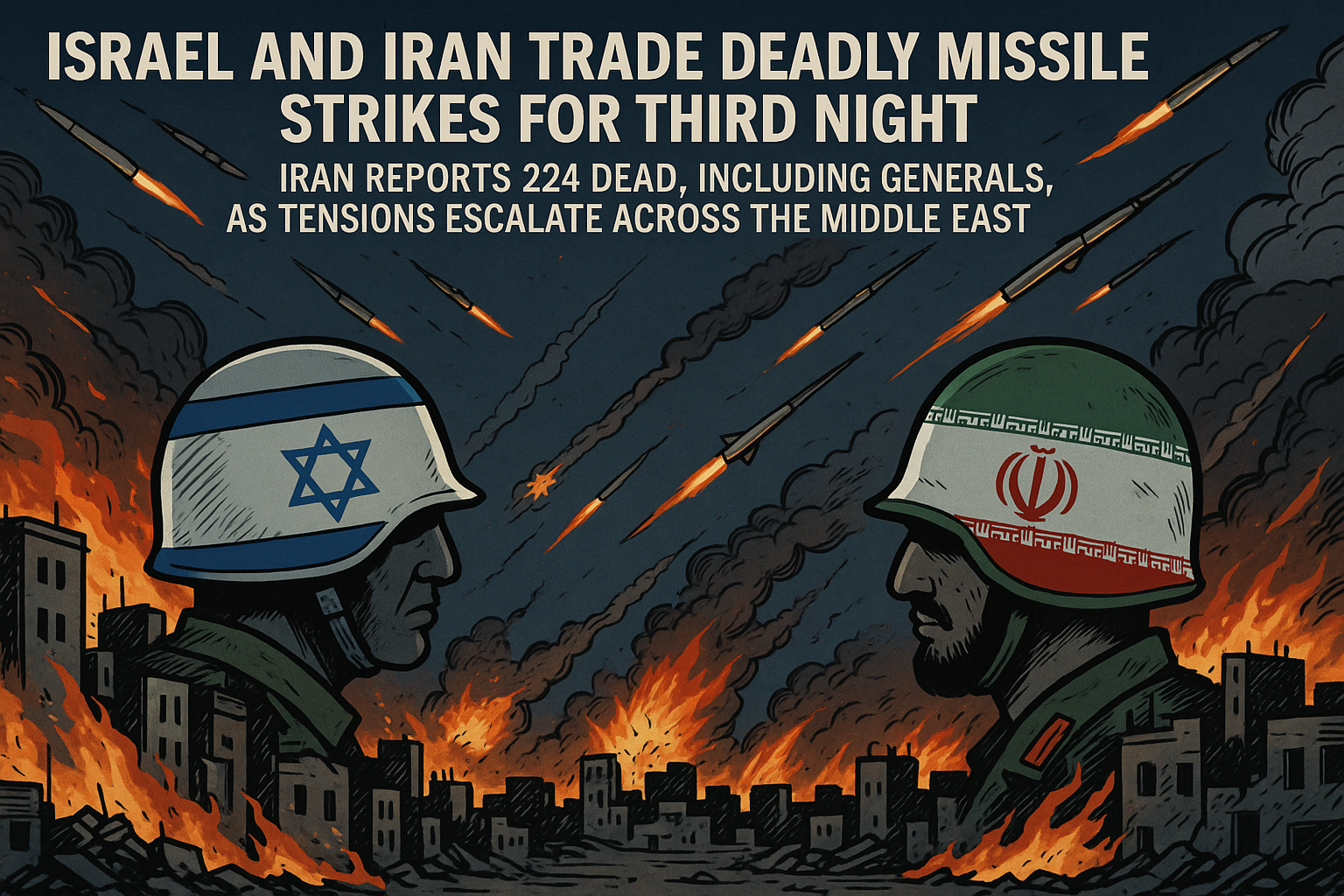
Third Night of Israeli Strikes: Tensions Soar as Iran Reports 224 Dead, Generals Among Victims
In a dramatic escalation of hostilities in the Middle East, the third night of Israeli strikes has left the region teetering on the brink of all-out war. Israel and Iran exchanged intense missile fire overnight, with both nations reporting high casualties and severe infrastructural damage. Tehran has claimed that at least 224 people have died since the Israeli offensive began on Friday, with senior military leaders among the deceased.
The third night of Israeli strikes witnessed a relentless assault on Iranian soil, targeting vital infrastructure, military installations, and populated urban centers. Iranian authorities stated that the latest wave of attacks resulted in the deaths of top generals from the Islamic Revolutionary Guard Corps (IRGC), including intelligence chief Brigadier General Mohammad Kazemi and his deputy General Hassan Mohaqiq.
Rising Death Toll and Civilian Suffering
According to the Iranian Health Ministry, the third night of Israeli strikes pushed the death toll to 224, with over 1,277 injured. Iran’s spokesperson for the Health Ministry, Hossein Kermanpour, claimed that 90% of the victims were civilians, as missiles hit residential buildings in densely populated areas. Harrowing footage aired on Iranian state television showed scenes of devastation in downtown Tehran, with families digging through rubble to locate loved ones.
Among the tragic incidents was the strike on a high-rise apartment building in Bat Yam, just south of Tel Aviv, which killed six people, including a 10-year-old boy and a 9-year-old girl. Israel’s emergency service, Magen David Adom, reported that 180 others were wounded in this strike alone, with at least seven people still missing beneath the debris.
Iran Targets Israeli Infrastructure in Retaliation
As part of the third night of Israeli strikes, Iran launched more than 270 missiles at Israeli territory since Friday, according to the Israel Defense Forces (IDF). While the majority of these projectiles were intercepted by Israel’s sophisticated multi-layered missile defense system, 22 penetrated the defenses, striking residential suburbs and causing the deaths of 14 Israeli civilians, along with 390 reported injuries.
Israeli cities including Jerusalem and Tel Aviv were under constant threat, with air raid sirens sounding throughout Sunday night. Videos from residents captured the sky lit up with missile trails and interceptions. The third night of Israeli strikes saw widespread fear and panic as shelters filled with civilians seeking refuge.
Israel Hits Back with Precision Airstrikes
In retaliation, Israel launched a series of precision airstrikes deep into Iranian territory. Israeli officials claimed that the third night of Israeli strikes demonstrated their near-total air superiority over Iran’s skies. Key targets included Iran’s Defense Ministry, missile launch pads, and factories manufacturing air defense components.
Notably, Israel reportedly bombed several oil refineries and energy infrastructure sites. Fires broke out at the Shahran oil depot north of Tehran and a fuel tank facility to the south, with Iranian officials confirming significant economic damage.
Among the destroyed facilities were parts of the Iranian Foreign Ministry, which was struck by Israeli missiles, damaging its library and several offices. Iran’s Deputy Foreign Minister Saeed Khatibzadeh released images showing shattered glass, twisted steel, and shelves of books torn apart by shrapnel.
Global Concerns and Ceasefire Calls Ignored
Despite growing international pressure for a ceasefire, the third night of Israeli strikes has confirmed that neither side is willing to back down. Iran has categorically refused to engage in ceasefire talks while Israeli attacks continue. Meanwhile, Israeli Prime Minister Benjamin Netanyahu has publicly rejected diplomatic overtures, stating that Israel will not stop until its objectives are achieved.
In an interview with Fox News, Netanyahu even hinted at a potential regime change in Iran as a possible outcome of the ongoing military campaign. He also alleged that Iranian forces were planning to transfer nuclear weapons to Houthi rebels in Yemen—a claim that has raised alarm in global diplomatic circles.
Trump’s Controversial Veto and US Involvement
Adding another layer to the crisis, former US President Donald Trump reportedly vetoed an Israeli plan to assassinate Iran’s Supreme Leader, Ayatollah Ali Khamenei. According to a senior US official speaking to the Associated Press, Trump blocked the move out of concern that such an escalation would spiral into a broader regional war.
Despite Iranian claims of American involvement in Israeli strikes, Trump has denied direct participation but praised Israel’s military actions. Two American officials, however, confirmed that US forces had assisted in intercepting Iranian missiles aimed at Israel during Friday’s initial attacks.
The third night of Israeli strikes has only deepened the US’s entanglement in this volatile conflict, raising fears that the war may spill over and affect American military bases in the Middle East. Iran has already issued threats to target US, UK, and French assets if they intervene.
India and Other Nations Monitor Closely
With the third night of Israeli strikes sending shockwaves across the globe, countries with citizens in the region are taking precautionary measures. India’s Ministry of External Affairs (MEA) stated that they are closely monitoring the situation and assisting Indian nationals and students in relocating to safer areas within Iran.
“The Indian Embassy is in touch with community leaders and making arrangements to ensure their safety and well-being,” said the MEA in an official statement.
Regional Fallout and the Risk of Wider War
The third night of Israeli strikes has pushed the Middle East into its most dangerous confrontation in years. What began as a targeted military campaign has quickly escalated into a regional crisis, with both sides inflicting significant damage and casualties. The killing of high-ranking IRGC officials and civilian deaths in both Iran and Israel have hardened positions, making a diplomatic resolution increasingly unlikely in the short term.
Israel’s strategy of hitting not just military but also governmental and energy-related targets suggests a broader attempt to cripple Iran’s war-fighting capacity. Meanwhile, Iran’s vow to “open the gates of hell” and its threats against Western powers indicate that Tehran is prepared for long-term conflict if provoked further.
Conclusion
As the world watches with bated breath, the third night of Israeli strikes marks a grim milestone in the Israel-Iran conflict. The growing death toll, destruction of infrastructure, and involvement of global powers like the United States indicate that the situation is far from contained. The coming days may decide whether this confrontation will remain a bilateral conflict or spiral into a broader regional war.
